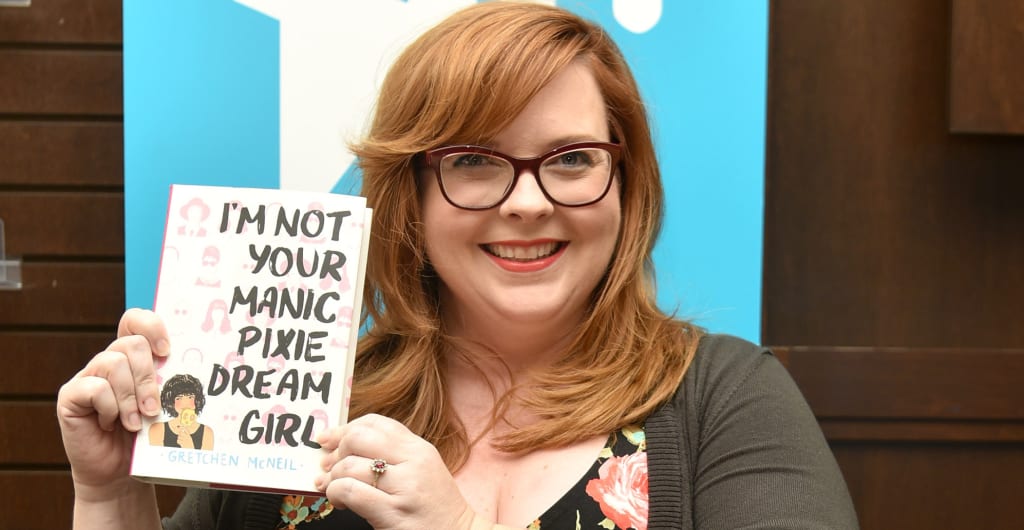Manic Autistic Pixie
Why Autistic women often fit the romantic mold of every "sensitive" asshole you've met

As a fun little welcome-to-the-show, i'll start personal. Ever since I had reached the age where myself and my peers were aware of the trope, I had been associated with it. I saw these characters who were slightly off but enjoying it in a very feminine way and I felt a kinship to them, like they were the endgame I was striving for. I loved dying my hair, watching kids shows, took up weird hobbies and fixated on whatever shiny object attracted my crow-brain.
But at the same time, the label was one that was hurled at me as an insult. I was doing it for attention, I wanted to appear attractive to men, I was annoying and needed to grow up and calm down.
I was well-versed in the trappings and triumphs, the pitfalls and sexist under and overtones of this archetype well before my first film class in college. And I had thankfully made peace with my affection for it by the time I realized I had autism. But it wasn't until Cheyenne Lin's video about the recent Disney+ adaptation of the book Stargirl that a few of the "But why?"'s started falling into place.
(hell of an opener, let's get to the science-y bits)
Women often go undiagnosed for autism, or they aren't diagnosed until much later in life. There are a few theories about why that is, and at least most of them are rooted in the patriarchy.
Women have historically, rarely been the subject of study for human behavior. With men seen as the default, why bother seeing the women at all? As a result, the way that neurodiversity differs between genders is not often examined. With most women only being diagnosed early if they present in a way that looks like that of their male counterparts.
But aside from physiological differences, there is a social aspect as well. An already ableist and sexist world is not likely to be kind to those who fall at the intersection. Boys who are a bit different are usually let free to their own devices, at least until things progress. But women have a much more standardized expectaion for their childhood years. We, from a young age, are meant to be motherly, caretakers, fit into a role. What this means, is that before most are even old enough to be tested, autistic girls will start masking.
Masking, in simplest terms, is when neurodivergent people intentionally or unconciously mimic the behaviors of their neurotyplical counterparts. While some might see this as harmless, it has profoundly detrimental long-term effects. There was a time when it was common for people who were born left-handed to be forced to write with their right. Many of these individuals later developed stutters, exteme anxiety and paranois, and other neurological issues.
Autism is not a disability, our brains are just left-handed. And forcing ourselves or being forced by others to exist and navigate the world different to what is intuitive and natural has been consistenly proven to be detrimental, and at times traumatising.
(Okay, I'm with you, but how does this connect to a movie troupe?"
The Manic Pixie Dream Girl (MPDG) is a female character who is somewhat child-like, usually has an off sense of style, tends to deviate from societal norms. I mean... you see it, right?
Autistic women have, for years, seen themselves in these characters. Most stories about autistic persons are about men, and even then they mostly focus of the autistic savant, a type that only makes up 10% of all autistic people. Even if it's unintentional, autistic women frequently enjoy and celebrate seeing a version of themselves being on-screen and appreciated.
(Great! So big win then? If this character type offers representaion then what's the problem?)
The problem with this troupe, is the problem that exists in nearly all autistic portrayals, it's not about us.
Aside from the fact that these characters don't get to be celebrated while wearing the autistic label, these stories use their neurodivergent characters as tools or obstacles for their "normal" protagonists. Just as Rain Man only exists so Tom Cruise's character can have an arc, the MPDG is only there to show that life is worth living for the jaded male love interest.
The key feature of a MPDG is that they are the one-dimensional object of affection for a purposefully or not bland man (the fact that these men are often stand-ins for the writer or director needs be remaked). Hence why carrying the label is such an insult.
Aside from what autistic traits i've attributed to myelf (Bizarre clothing, prolonged interest in children's entertainment/items, special interests and different perspectives) many common traits among autistic women are an increased sense of empathy, and a nurturing nature.
Why these traits are important, is that while the other traits can be seen as quirky and cute, enough to endear these people/chracters to anyone on the street, it's that specific motherly-ness that gives this troupe its legs.
It's been well-documented and discussed in feminist circles that when emotionally underdeveloped men begin seeking a partner, they look for one to fill the role that their mother no longer does. Someone who can be their emotional crutch, who will listen to their problems and cater to what they need.
Not only do these representatives of autisic women exist primarily as a sexy narrative tool, but even if those that are fully developed characters are doomed to a relationship with a man who sees them as a replacement for therapy.
(I mean, that's a bit of a stretch isn't it?)
Most of my adult relationships were entered into (unknowingly on my part) with the other person seeing me as a band-aid to their problems. I was interesting so they could seem cooler, I was the one they could complain to so they didn't need to address their own flaws, I could walk them trough how to approach their emotional issues so then the weight was off their shoulders and onto mine. I had to be everything they needed, and I couldn't need anything.
This, through rigourous journalistic research and reddit scrolling, is apparently the norm for many neurodivergent women. We're not a partner, we're a novelty item they can use to replace their collection of self-help books.
(Christ, okay... So how do we fix this?)
Fuck if I know, I just live here.
To say that we need to be better in both our treatment of women and of people who are not neurotypical has been done to little success, to say nothing of those who are LGBT+ or POC.
Advancements are being made, The Show "Everything's Going to Be Okay" does a wonderful job of portraying a girl with autism who is also get to be a character. and there are plenty of autistic-coded women who have been allowed to exist as fully-developed individuals.
Amelie, Clementine from Eternal Sunshine of a Spotless Mind, Bee from Bee and Puppycat, like half of the women from Grey's Anatomy.
"Nothing about us, without us", has become a recent demand from the neurodivergent community, the internet that once dubbed and decimated the MPDG has also allowed us to find each other, and now we can demand that we don't just see ourselves in autistic-coded characters, but characters who are openly and proudly one of us.
The Manic Pixie Dream Girl will forever be tainted by how she was used by thoughtless male writers, but in her place we can do something more intelligent, more inclusive, and more honest, and we can do it while still keeping the fun hair colors.
Bibliography:
https://somegirlwithabraid.wordpress.com/2017/09/02/the-manic-pixie-autistic-sidekick/
https://neuroclastic.com/2020/04/08/how-the-manic-pixie-dream-girl-harms-autistic-women/
https://filia.org.uk/latest-news/2020/4/2/autism-acceptance-day-autistic-women-in-patriarchy
http://martinemussies.nl/web/i-am-not-your-manic-pixie-dream-girl/
https://www.youtube.com/watch?v=XRvv2vPj8pM
https://www.youtube.com/watch?v=DvwtPD6o_z4&list=PLOtj9wtCSdn2Lqspu5us1hsZTiYeOxOo2&index=13
About the Creator
Alex Brown
Mostly politically slanted and very clearly influenced by Youtube video essayists






Comments
There are no comments for this story
Be the first to respond and start the conversation.